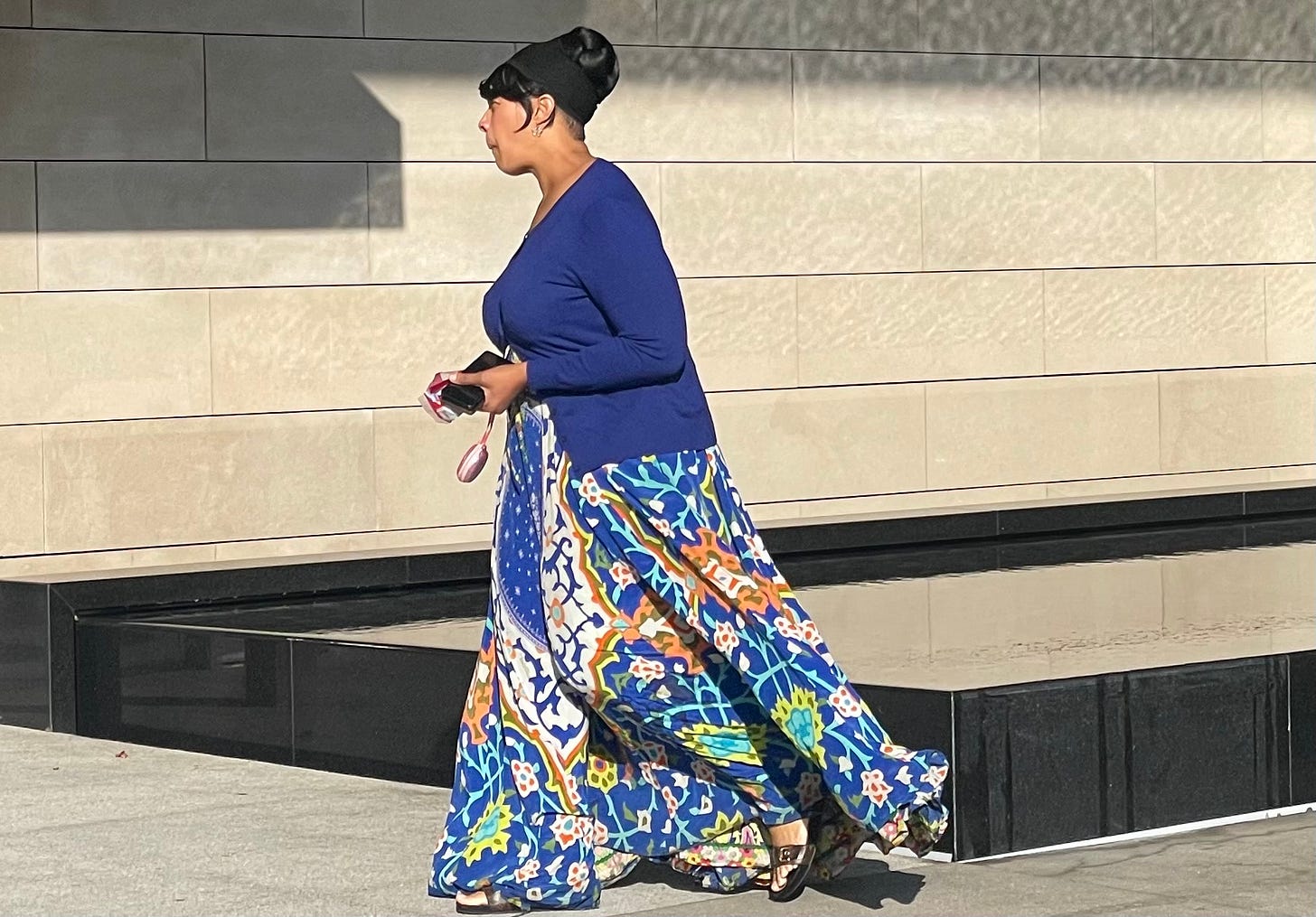Nigerian politician's wife jailed in Los Angeles after jury convicts on Medicare fraud charges
The Redondo Beach woman owned two medical device companies specializing in power wheelchairs that jurors concluded fueled a decade-long, $24 million fraud.

Four months ago, a Los Angeles jury deadlocked on Medicare fraud charges against a device supplier whose lawyer described her as duped by her own employees and distracted by her husband’s political career in Nigeria.
Tamara Yvonne Motley blamed Chad M. Lewin for not getting her acquitted, and she fired him in an insult-laden phone call that Lewin memorialized in his request to formally withdrawal as her counsel.
“Ms. Motley blamed me for the hung jury and stated that a better attorney would have resulted in a not guilty verdict. She informed me she would be seeking new counsel from the Court,” Lewin wrote.
This week, a different jury convicted Motley of 23 felonies after hearing only part of the defense Lewin laid before the jury that spared her from conviction. Her new lawyer was by her side when U.S. District Judge Stanley Blumenfeld Jr., ordered her jailed immediately. She faces up to 20 years in prison at sentencing, which Blumenfeld scheduled for Oct. 3.
The 54-year-old Redondo Beach resident had been fighting the charges for nearly six years. Her husband, Ahmed Ogembe, was the elected senator of Nigeria’s Kogi Central Senatorial District when she was indicted in 2016. He lost re-election in 2019, then appears to have lost election again this year.
Motley was out of jail on $275,000 bond and an electronic monitor before her conviction, but she hasn’t been to Nigeria in several years: In 2018, U.S. District Judge Fernando M. Olguin overturned an order from U.S. Magistrate Judge Patrick J. Walsh that would have allowed Motley to travel to Nigeria over the objection of prosecutors, who warned: “It is typically very difficult, if not impossible, to secure the return of a defendant from Nigeria.”
Motley’s lawyer at the time described her husband as a “a high profile person in Nigeria” and said it would be “nearly impossible” for her to hide because of that, but prosecutors said his “high profile status would only complicate extradition.”
The first jury heard about Motley’s travels to Nigeria when Ogembe was campaigning for the 2015 election, but Judge Blumenfeld declared the topic off limits for the second trial after prosecutors complained the testimony was “solely designed to improperly evoke the sympathy of the jury.”
Assistant U.S. Attorneys Kristen Williams and David Chao said Motley referenced Ogembe’s politicking during cross-examination “to portray herself as an all-but-single mom struggling to raise a child and to support the demanding career of a spouse pursuing a career in public service in Nigeria.”

Motley’s new attorney, Mark Kassabian, argued her frequent travels and Ogembe’s demanding political career could show she was too busy to know employees at her medical device company were defrauding her.
“Having a spouse running for office is certainly more demanding of a person’s time and attention than, say, having a spouse working as a suburban accountant or lawyer,” Kassabian, of Buehler & Kassabian, LLP in Pasadena, wrote in his opposition to prosecutors’ motion in limine. “That she was preoccupied with, and distracted by, her husband’s political campaigns in Nigeria during substantial periods of the alleged fraud could show, again, that she did not know about the fraud.”
Still, Kassabian said the information may not help his client.
“The notion that jurors would naturally sympathize with the wife of a politician is fanciful. Contrary to the government’s assertion, politicians are not naturally sympathetic characters, and West African politicians perhaps even less so,” he wrote.
Kassabian never got the issue before the jury. Instead, the 12 people who convicted Motley were allowed to hear only that she traveled out of the country, not that she weren’t to Nigeria.
Williams and Chao said it was for her own good.
“The risk of undue prejudice is significant: it could engender sympathy for the defendant among some jurors, or — as defendant concedes — it could just as easily arouse antipathy toward defendant among jurors with certain preconceptions of West African political regimes,” they wrote in their reply.
Jurors began deliberating Monday afternoon and returned their verdict Tuesday at 11:41 a.m., about three hours after reconvening.
The verdict followed five days of testimony about a $24 million, 10-year scheme involving power wheelchairs and repairs. As prosecutors described it, Motley paid marketers to find Medicare patients for her medical equipment businesses, then used her employees to bill Medicaid for power wheelchairs the patients didn’t need.
A U.S. Attorney’s Office press release described Motley as the “defacto owner” of Action Medical Equipment and Supply, Inc., in Hawthorne, near Los Angeles, from 2006 to 2014, and of Kaja Medical Equipment & Supplies, Inc. in Ventura from 2013 to 2016.
Williams said in the first trial that Motley and her office manager, Cynthia Karina Marquez, would cook up a billing scheme “if they wanted a new car, wanted to go to Las Vegas,” she said.
Motley changed her method to focused on repairs after Medicare changed its procedures in 2011 and stopped reimbursing people as lucratively for power wheelchairs, Williams said.
The repairs “often simply were not performed,” prosecutors said, while Motley and her employees often charged Medicaid $3,000 to $4,000 for each booking.
The scams “accounted for nearly half of Action’s billings and almost all of Kaja’s,” the U.S. Attorney’s Office said.

Other defendants included Marquez and former wheelchair repair technician Juan Murillo. (UPDATE: Neither testified against Motley as previously reported. I apologize for the error!)
Marquez, 47, was sentenced to time served in jail, three years probation and nearly $9.8 million restitution after pleading guilty in December 2019 to two counts of making false statements affecting a health care program.
Murillo, 46, was sentenced to three years of probation and $2.5 million restitution after pleading guilty in November 2019 to one count of conspiracy to commit money laundering.
In the first trial, Lewin told jurors that Marquez and Murillo stole from Motley without her knowledge then wrongly blamed her for their crimes. He said testimony showed Motley was good at marketing and sales but “there has been no evidence in this trial that she was good at anything else.”
“They evidence seems pretty clear that they stole from her,” Lewin said, calling Motley “just a foolish and careless business person.”
Jury notes indicate the deadlock was lopsided. The foreperson complained of “Juror #1” on the second day of deliberations, writing at 8:30 a.m. that “many of us are feeling very uncomfortable” with him “raising his voice, talking over everybody and not following jury instructions.”
The jury sent another note at 10:25 a.m. that said Juror #1 “is intransigent, and continues to refuse to dialogue concerning evidence.”
“Despite unanimous agreement among all other jurors, he continues to belligerently refuse to engage,” the note said “Many of us wonder if this behavior will escalate into a more dangerous situation.”
Judge Blumenfeld replied to both notes by telling the jury to “resume deliberations.”
A new note at 2:15 p.m. announced a juror “would like to let you know that she is quitting because she feels deliberation is not fair” because of Juror #1.
Judge Blumenfeld called a mistrial after a fourth note at 2:35 p.m. announced: “Deliberation has stopped.”
“Juror #1 refuses to view any other jurors point of view, he refuses to acknowledge the defendant is on trial not Medicare, not the prosecution,” the note said. “Jurors are shutting down because he refuses to honestly deliberate the facts of the evidence.”
Motley responded to the mistrial — widely considered a good thing for defendants — by criticizing Lewin for not persuading the jurors to acquit her, according to Lewin.
“The relationship has been strained from the beginning,” Lewin wrote in a withdrawal motion filed the day after the mistrial. “The relationship completely broke last night, February 16, 2023 when Ms. Motley blamed counsel for the hung jury, insulted counsel, and terminated counsel.”
“Counsel cannot represent a client to whom he cannot communicate, who blames him for the alleged shortcomings of the first trial, and who cannot assist him in defending her in future proceedings,” wrote Lewin, who owns Lewin Law Group, APC, in Studio City.

Lewin said Motley was upset her mother traveled to Los Angeles from Las Vegas “against doctors’ orders” to help her but wasn’t allowed as a witness because Judge Blumenfeld deemed her testimony irrelevant.
Lewin said Motley “has never followed my advice, which is her prerogative.”
“However, within those discussions there has been extreme animosity and those discussions have been extremely contentious,” Lewin wrote in his declaration. “Despite the contentious relationship, I prepared and conducted to the best of my ability.”
Lewin said he also made a point of being nice to Motley in front of the jury “so as to ‘humanize’ her.”
“After the court declared a mistrial yesterday, on February 16, 2023, Ms. Motley was very upset. She wanted to know why there was going to be another trial, despite the fact that I had advised her on numerous occasions that in the event of a hung jury and/or mistrial the Government would likely seek to retry her on all of the charges,” Lewin wrote.

Prosecutors opposed Lewin’s withdrawal request, saying his purported conflict appeared “manufactured” to delay the second trial.
They tried to cast doubt on Lewin’s claim that his relationship with Motley was always strained, saying he’d told them he “had a good relationship” with Motley and “that he had spent a lot of time with her going over the discovery, had finally “got[ten] her to understand what she was facing” such that the “light bulb [was] going off” for her based on their discussions.”
Blumenfeld sided with Lewin and let him leave the case. Kassabian was appointed through the Criminal Justice Act Panel for indigent defendants.
The second jury appears to have had a potential rogue, too, but it was an alternate.
A review of the case file shows Judge Blumenfeld dismissed Alternate Juror #1 after the juror sent a note saying he understands “that the police/law wants to find bigger fish” such as social workers and doctors.
Deliberations went much smoother than the first time. The jury sent only one note: The one announcing they’d reached a verdict.
Motley was in jail a few hours later. She was convicted of 20 counts of health care fraud, two counts of aggravated identity theft and one count of conspiracy to commit money laundering.
She faces up to 10 years in prison for each health care fraud count, up to 20 years in prison for the money laundering conspiracy count, and, for the aggravated identity theft counts, a mandatory sentence of two years in prison consecutive to the other sentences.
The full documents are below for paid subscribers, including all Nigeria-related filings. Your support makes my work possible amid a very bleak outlook for journalists. Thank you!









